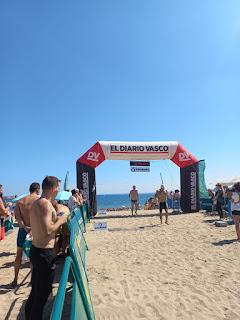(...)
Cuando los dos tiempos se unen, la desesperación.Cuando los dos tiempos se separan, la alegría.
(Alan Lightman, Los sueños de Einstein)
TXINGUDIKO BADIAKO XVII IGERIALDIA HELDUAK
"“What is your faith, Dad?” asked a middle-aged man, who stood by his cart on the same side of the raft.
“I have no kind of faith, because I believe no one—no one but myself,” said the old man as quickly and decidedly as before.
“How can you believe yourself?” Nekhludoff asked, entering into a conversation with him. “You might make a mistake.”
“Never in your life,” the old man said decidedly, with a toss of his head.
“Then why are there different faiths?” Nekhludoff asked.
“It’s just because men believe others and do not believe themselves that there are different faiths. I also believed others, and lost myself as in a swamp,—lost myself so that I had no hope of finding my way out. Old believers and new believers and Judaisers and Khlysty and Popovitzy, and Bespopovitzy and Avstriaks and Molokans and Skoptzy—every faith praises itself only, and so they all creep about like blind puppies. There are many faiths, but the spirit is one—in me and in you and in him. So that if every one believes himself (IF EVERYBODY'S TRUE TO HIMSELF) all will be united. Every one be himself, and all will be as one.”
The old man spoke loudly and often looked round, evidently wishing that as many as possible should hear him.
“And have you long held this faith?”
“I? A long time. This is the twenty-third year that they persecute me.”
“Persecute you? How?”
“As they persecuted Christ, so they persecute me. They seize me, and take me before the courts and before the priests, the Scribes and the Pharisees. Once they put me into a madhouse; but they can do nothing because I am free. They say, ‘What is your name?’ thinking I shall name myself. But I do not give myself a name. I have given up everything: I have no name, no place, no country, nor anything. I am just myself. ‘What is your name?’ ‘Man.’ ‘How old are you?’ I say, ‘I do not count my years and cannot count them, because I always was, I always shall be.’ ‘Who are your parents?’ ‘I have no parents except God and Mother Earth. God is my father.’ ‘And the Tsar? Do you recognise the Tsar?’ they say. I say, ‘Why not? He is his own Tsar, and I am my own Tsar.’ ‘Where’s the good of talking to him,’ they say, and I say, ‘I do not ask you to talk to me.’ And so they begin tormenting me.”
“And where are you going now?” asked Nekhludoff.
“Where God will lead me. I work when I can find work, and when I can’t I beg.” The old man noticed that the raft was approaching the bank and stopped, looking round at the bystanders with a look of triumph.
Nekhludoff got out his purse and offered some money to the old man, but he refused, saying:
“I do not accept this sort of thing—bread I do accept.”
“Well, then, excuse me.”
“There is nothing to excuse, you have not offended me. And it is not possible to offend me.” And the old man put the wallet he had taken off again on his back. Meanwhile, the post-cart had been landed and the horses harnessed.
“I wonder you should care to talk to him, sir,” said the driver, when Nekhludoff, having tipped the bowing ferryman, got into the cart again. “He is just a worthless tramp.”"
(Leo Tolstoy, Resurrection (1899-1900))




No comments:
Post a Comment